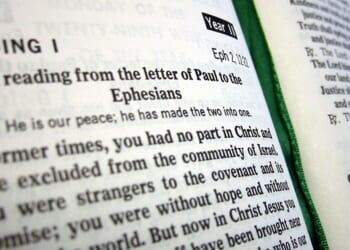“THE poetry of Psalms, stuffed with paradox, emotion, and metaphors for every season of the soul is the mode of reading that shapes the soul. Its sweetness draws us in so that our desires can be molded by and for the living God.”
So states Ethan Jones in his powerful paperback on the psalms as poetry for life. He characterises our age as one of distraction — of short attention span and existential boredom, on the one hand, and yet overstimulation and satiety, on the other. How do we “turn off”?
The solution offered here is that we give time and attention to reading poetry, specifically that of the psalms as poetry focusing our attention on God. Studying, sitting down, paying attention — these are all disciplines that we have all but lost, but, in the effort to declutter our lives, satisfy curiosity, and find a certain inner peace and solitude, the psalms, Jones contends, offer us an opportunity to hear afresh the voice of God speaking to us as we ponder, meditate, and pray.
Jones cites Athanasius, who likened the psalms to a garden full of varied plants and saw them as songs of sweetness for the soul. Lives can be reconfigured by attention to each and every psalm, whatever the genre may be — whether it be lament, praise, wonder at creation.
He challenges recent scholarship that has reconstructed a metanarrative for the whole Psalter, arguing instead that psalms are individual “praises”. They are to be read and re-read, heard and recited, and they are “open”, in that the imagery, metaphor, and even the historical details that they contain are not constraining, but offer opportunities for ever fresh meanings that speak to individual lives. They contain stimulating metaphors, paradoxes, concise language, and a whole range of emotions — despair, frustration, joy, confidence, and delight, and ultimately truth about God. They are scripture and hence from God, but they are also prayers to God: they are about communicating with the divine and reconfiguring and reshaping individual lives.
After Part 1 has introduced wider concepts, in Part 2 the author gives examples of psalms and advises reading them in ever invigorating and diverse ways. He gives us some personal anecdotes, and one gets a sense of his own lifelong engagement with these poems, in his daily prayer life and in his liturgical life in the Church, as well as in academic engagement and enrichment. This is a good read for those seeking to appreciate the Psalter afresh. After all, this book of the Bible has always been a bedrock of Christian worship in liturgy and prayer.
Dr Katharine J. Dell is Director of Studies in Theology and Religious Studies at St Catharine’s College, Cambridge, and Professor in Old Testament Literature and Theology in the University of Cambridge.
Psalms in an Age of Distraction: Experiencing the restorative power of biblical poetry
Ethan C. Jones
Baker Academic £19.99
(978-1-5409-6764-0)
Church Times Bookshop £17.99
















